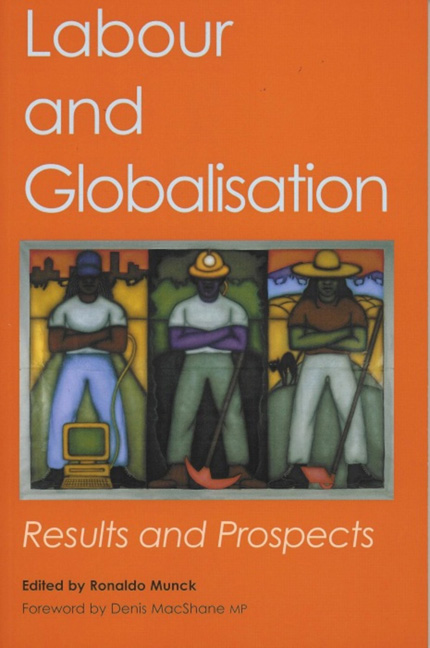Book contents
- Frontmatter
- Contents
- Acknowledgements
- Foreword
- Notes on the Contributors
- List of Abbreviations
- Introduction: Globalisation and Labour Transnationalism
- Part I Global Dimensions
- 1 An Emerging Agenda for Trade Unions?
- 2 The ICFTU and the World Economy: A Historical Perspective
- 3 Globalisation, Imperialism and the Labour Standards Debate
- 4 Towards Global Networked Unions
- Part II Spatial Dimensions
- Part III Social Dimensions
- Index
3 - Globalisation, Imperialism and the Labour Standards Debate
from Part I - Global Dimensions
- Frontmatter
- Contents
- Acknowledgements
- Foreword
- Notes on the Contributors
- List of Abbreviations
- Introduction: Globalisation and Labour Transnationalism
- Part I Global Dimensions
- 1 An Emerging Agenda for Trade Unions?
- 2 The ICFTU and the World Economy: A Historical Perspective
- 3 Globalisation, Imperialism and the Labour Standards Debate
- 4 Towards Global Networked Unions
- Part II Spatial Dimensions
- Part III Social Dimensions
- Index
Summary
The issue of international labour standards poses a dilemma for groups working nationally and internationally for increased equality and fairness in the workplace. Many groups agree that improved working conditions should be a goal, but disagree about what can or should be done on the international stage. Recent debate has centred around whether core labour standards should be linked to trade under the World Trade Organization (WTO). However, there has also been concern about the unilateral action of developed states to enforce labour standards and the activity of consumer and other NGOs around codes of conduct and publicity campaigns. This division between equity advocates makes their already difficult task more formidable.
Rather than arguing the case for or against particular labour standards proposals this study examines the multiple and interlocking sources of power and domination that characterise relations around global labour issues. It argues that the difficulty equity advocates have in agreeing upon a labour issues strategy can be attributed to the complex nature of modern imperialism and its historical legacy. Nevertheless, transformation in the nature of global domination provides the opportunity for new strategies of resistance and cooperation on labour standards issues.
The argument evolves in three sections. The first section discusses the concept of imperialism and how it is used in this paper. It outlines how the configuration of the trade regime and the activity of Western unions in the Cold War contributed to imperial expansion and left a historical legacy. It is this legacy that throws a shadow over present-day equity advocates. In addition, this section argues that the social basis of imperialism has changed in the post-war period by detaching organised labour from the ruling coalition. This has provided the opportunity for Western labour to redefine its interests and engage in coalition-building with equity-focused groups in other countries. However, labour's own imperial legacy poses an obstacle to potential cooperation and colours its views of policy options. This will be illustrated by reference to two cases in the second section of the paper. The case of the controversy of incorporating core labour standards into the oper ation of the WTO and the issue of child labour in export industries will be considered. The WTO debate highlights the clash within and between groups confronting international institutions which are already perceived to be favouring Northern interests.
- Type
- Chapter
- Information
- Labour and GlobalisationResults and Prospects, pp. 52 - 70Publisher: Liverpool University PressPrint publication year: 2003

